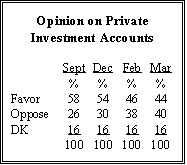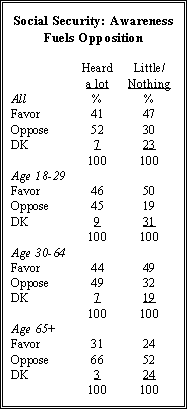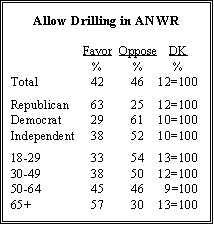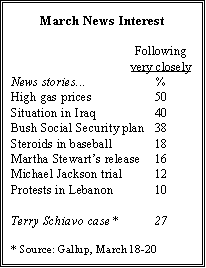Summary of Findings
 The American public is not happy with the nation’s political leadership. President Bush’s approval rating remains below 50%, and just 39% approve of the job performance of Republican congressional leaders. Despite the paltry ratings for GOP leaders, however, Democrats have failed to benefit. The public has about the same low regard for the job performance of Democratic leaders as for the Republicans (37% approval).
The American public is not happy with the nation’s political leadership. President Bush’s approval rating remains below 50%, and just 39% approve of the job performance of Republican congressional leaders. Despite the paltry ratings for GOP leaders, however, Democrats have failed to benefit. The public has about the same low regard for the job performance of Democratic leaders as for the Republicans (37% approval).
Public attitudes toward leaders in both parties have not changed much over the past year, but have declined markedly over the longer term. In early 2003, at the start of the last congressional session, job approval ratings for both the president and GOP congressional leaders were significantly higher (58%, 48% respectively). And in early 2002, only a few months after the 9/11 attacks, Americans were more unified behind the government and its leaders.
The latest national survey by the Pew Research Center for the People & the Press, conducted March 17-21 among 1,505 Americans, finds that Democrats have increasingly soured on the performance of their own party’s congressional leaders.
 Democrats’ approval of the party’s leadership stands at 56%; by contrast, fully three-quarters of rank-and-file Republicans (76%) have a positive view of their party’s congressional leaders. About a year ago, 63% of Democrats approved of the performance of Democratic congressional leaders.
Democrats’ approval of the party’s leadership stands at 56%; by contrast, fully three-quarters of rank-and-file Republicans (76%) have a positive view of their party’s congressional leaders. About a year ago, 63% of Democrats approved of the performance of Democratic congressional leaders.
About a year ago, 63% of Democrats approved of the performance of Democratic congressional leaders.
As Congress wrestles with Social Security and other contentious issues, the public expresses negative views of the institution in several areas.
Fewer than a quarter say Congress is doing an excellent or good job of dealing with important issues (23%), acting ethically (23%), and understanding people’s needs (20%). And just 18% feel Congress is doing well in working across party lines. Yet the public, like Congress, is deeply divided over the issues at the top of the legislative
 Support for President Bush’s goal of private investment accounts in Social Security remains well below its level in December. Currently, 44% approve of the idea, compared with 46% last month and 54% in December. Americans also are split over an administration-backed plan to permit oil and gas drilling in the Alaskan Arctic National Wildlife Refuge; 46% oppose that plan, while 42% favor it.
Support for President Bush’s goal of private investment accounts in Social Security remains well below its level in December. Currently, 44% approve of the idea, compared with 46% last month and 54% in December. Americans also are split over an administration-backed plan to permit oil and gas drilling in the Alaskan Arctic National Wildlife Refuge; 46% oppose that plan, while 42% favor it.
Social Security: Young People Less Supportive
 While public opinion on private investment accounts has not changed much in the past month, support for the idea among younger Americans — who up to this point have been the most reliable backers of the proposal — has weakened significantly. In February, people age 18-29 favored the idea of private accounts by a 66%-19% margin. Today, just 49% favor private accounts, while 25% are opposed, and nearly as many (26%) say they don’t know how they feel about the issue.
While public opinion on private investment accounts has not changed much in the past month, support for the idea among younger Americans — who up to this point have been the most reliable backers of the proposal — has weakened significantly. In February, people age 18-29 favored the idea of private accounts by a 66%-19% margin. Today, just 49% favor private accounts, while 25% are opposed, and nearly as many (26%) say they don’t know how they feel about the issue.
Despite the White House effort to keep Social Security reform on the front burner, public awareness of the issue has not increased substantially over the past month. Today, 46% say they have heard a lot about the proposal to add private accounts to Social Security, up only slightly from 43% in mid-February. About one-in-five (22%) say they have heard nothing at all about the proposal, unchanged from 21% a month ago.
 There continue to be significant age differences in attentiveness to the president’s plan. Just 24% of those under age 30 say they have heard a lot about private accounts; those age 30-49 are more aware (41% have heard a lot). By comparison, 60% of people age 50-64, and 65% of those age 65 and older have heard a lot about the proposal.
There continue to be significant age differences in attentiveness to the president’s plan. Just 24% of those under age 30 say they have heard a lot about private accounts; those age 30-49 are more aware (41% have heard a lot). By comparison, 60% of people age 50-64, and 65% of those age 65 and older have heard a lot about the proposal.
In general, opposition to the plan to allow private accounts is much higher among people who have heard a lot about it than among those who are less familiar with it. Overall, people who have heard a lot about the plan oppose it by 52%-41%, while those who have heard little or nothing favor it by a 47% to 30% margin.
This pattern is significant even when age is taken into account. In particular, people under age 30 who have heard a lot about the proposal are more than twice as likely as their less engaged peers to oppose the idea (45% vs.19%). And among older age groups, where opposition is higher even among people who have not heard much about the private accounts proposal, those who have heard a lot express the most opposition.
Divided Over Alaska Drilling
The close vote on Capitol Hill on legislation to allow oil exploration and drilling in the Arctic National Wildlife Refuge (ANWR) reflects a divided public. Overall, 42% of Americans say they would favor opening the Refuge to oil and gas drilling, while 46% are opposed. Beyond the expected partisan gap on this issue is a significant generational divide. Most younger Americans oppose the decision to allow drilling in ANWR, while most seniors are in favor.
 Views on ANWR drilling reflect broader differences over the tradeoff between the nation’s energy needs and environmental protection. Asked which should be a more important priority for the country, 49% say developing new energy sources, while 42% say protecting the environment. This is unchanged from previous surveys in 2001 and 2002.
Views on ANWR drilling reflect broader differences over the tradeoff between the nation’s energy needs and environmental protection. Asked which should be a more important priority for the country, 49% say developing new energy sources, while 42% say protecting the environment. This is unchanged from previous surveys in 2001 and 2002.
News Interest: Gas Prices, Iraq
The high price of gasoline leads this month’s news interest index, with 50% of the public following news reports on this topic very closely. While topping the current list, the public is giving less attention to the high price of gasoline these days than in October of last year (64% very closely).
Four-in-ten are following news about the current situation in Iraq very closely, with no significant change from a month ago. Public attention to George W. Bush’s proposal to deal with the Social Security system grew to 38% from 31% a month ago, though young people remain largely disengaged from the issue. Barely a quarter (27%) of people under age 30 are following Social Security news very closely, compared with nearly half (48%) of people age 50 and older.
 Although the Terry Schiavo case has dominated the news, it is unclear whether public interest in the story is commensurate with the wall-to-wall coverage. While not covered in Pew’s survey which started Thursday night (March 17), a Gallup survey conducted Friday through Sunday found 27% of Americans following news about Terry Schiavo’s situation very closely. That is significantly lower than public interest in gas prices, Iraq and Social Security as measured in this survey.
Although the Terry Schiavo case has dominated the news, it is unclear whether public interest in the story is commensurate with the wall-to-wall coverage. While not covered in Pew’s survey which started Thursday night (March 17), a Gallup survey conducted Friday through Sunday found 27% of Americans following news about Terry Schiavo’s situation very closely. That is significantly lower than public interest in gas prices, Iraq and Social Security as measured in this survey.
Three other high-profile news stories rank even lower on the public’s list of news interests: Reports of steroid use by some Major League Baseball players (18%) and Martha Stewart’s release from prison (16%) were followed closely by fewer than one-in-five Americans, and the Michael Jackson trial (12%) received even less attention. There is a significant gender gap with respect to news about steroid use, with 22% of men and just 14% of women following very closely. There is an even wider racial gap with respect to the Michael Jackson trial, with 27% of blacks following very closely compared with 11% of whites.
Aside from the situation in Iraq, public interest in other foreign political news remains very limited. Just 10% followed news about protests and political changes in Lebanon very closely, while 36% said they didn’t follow this story closely at all. Men age 50 and older were much more interested in reports from Lebanon — 20% followed very closely compared with just 8% of the rest of the country.


